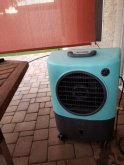Can one really "buy their way out" of the physical solar panel size restrictions and van-wall energy efficiency restrictions that a van imposes when addressing the concept of full vehicle climate control? I personally don't think that money can buy a solution and only future increased solar energy density is going to fix that. Sure if one wants to tap into a special alternator and make running a very large petro engine the heart of the system and part of the daily life ritual, that can happen but here you are really just re-routing foscil fuel energy and stuffing that energy into a lithium bank and at this point can you really even call your setup a "solar power system" any longer? Proportionally speaking, all the solar in this situation is providing is the standard appliance power needs that a lead/acid setup would likely address fine. Maybe this is where my own disconnect occurs and that is in what such a system is called.
I know another owner of a camper just like mine and he hails that we have now reached the day of all solar. He runs all induction burners, has removed his propane tank, has an electric refrigeration, electric water heater, etc. He also casually mentions that he is constantly on the move. Had I listened to the final description of his system (constantly on the move and his earlier "souped up alternator setup" statement), then it would have come clear to me that his system is a petroleum energy storage system and not a solar system and that would have made more sense to me. I also recall comments from him of how running the engine every day or two is not a big deal. So in this case, I don't think this qualifies any longer as a "solar system".
So this alternator as the heart of your system and giant lithium battery bank stratedy needs to be addressed for all those who have small vehicles and are looking at youtube videos lusting for the 24/7 full-facility, 100% duty cycle (to make up for the lack of insulation) spit AC systems that the youtube content click-bait enticers are tempting everyone with. I don't think the divided port ABS with a 200aH battery pack and 300-500w space on the roof top that the typical DIY project is providing is going to cut it.



